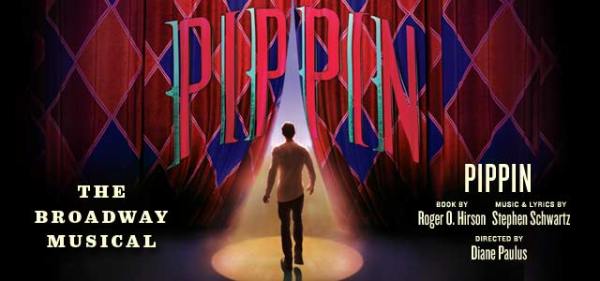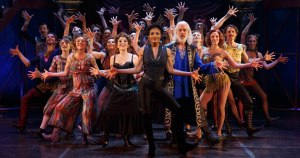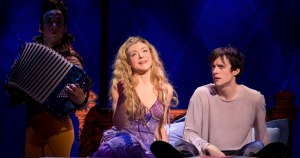
They’ve got magic to do, just for you. In the newest revival of Pippin, all the world’s a circus stage, populated by the limber and attractive acrobatic Players. The Lead Player (Patina Miller) addresses the audience, readying us for the story of Pippin (Matthew James Thomas), the son of Charlemagne (Terrence Mann), and his quest to find his purpose. It’s a magical coming of age journey set to 1970s music with a 9th century backdrop.
Pippin’s quest for purpose and fulfillment takes him from joining Charlemagne’s army to a sexual orgy to a simple life in the country. Each episode proves to be unsatisfying, but his journey, narrated and coached by the Lead Player, is building towards one final, ultimate act. But the Lead Player’s role in Pippin’s life proves to be just as nefarious as the power hungry family he’s surrounded by.
 Interwoven in the story are dance numbers and magic illusions performed by the Players (reminiscent of the Kit Kat Club in Cabaret and the musical numbers in the film version of Chicago). With an ensemble cast of trained circus performers and skilled acrobats, their impressive choreography and tricks appear effortless on stage. This only adds to the magic of the world of Pippin, making the show a truly unforgettable theatre-going experience.
Interwoven in the story are dance numbers and magic illusions performed by the Players (reminiscent of the Kit Kat Club in Cabaret and the musical numbers in the film version of Chicago). With an ensemble cast of trained circus performers and skilled acrobats, their impressive choreography and tricks appear effortless on stage. This only adds to the magic of the world of Pippin, making the show a truly unforgettable theatre-going experience.
It’s a solid and successful musical with lyrics and music by Stephen Schwartz (Godspell, Wicked). He presents a life lesson in the story of Pippin about how the quest for an extraordinary life may be ultimately unfulfilling. And, in this 2013 revival—directed by Diane Paulus—the final act of Pippin does feel unfulfilling.
The number one reason for this is the insertion of an intermission into the middle of the musical. Pippin is written as a one-act musical, and interrupting the story with an intermission kills a lot of the story’s momentum. But, as the Lead Player tells us in the revival of the show, the intermission is included because audience attention spans have shortened over time (a factor that Martin Scorsese didn’t factor into his 3-hour Quaalude opus Wolf of Wall Street). So, essentially, we only have ourselves to blame for the interruption in the story’s flow.
But even I could get past that, if it weren’t for the lackluster material provided in the second act. The magic of act one vanishes as a desolate Pippin wallows in an ordinary life. The lesson here works well for the story’s arc, but it feels that too much time is spent developing the inevitable character changes that occur (and one can only handle Pippin almost walking off-stage so many times).
 Yet, what makes this act really flounder is Catherine. Played by Rachel Bay Jones with a squeaky voice, her chemistry with Pippin and her role in his life feel false and uninspired. (What’s the deal with all these squeaky love interests in musicals right now? Wasn’t Annaleigh Ashford’s nasally Lauren enough of a novelty in Kinky Boots?) It’s hard enough to buy them as a couple, much less believe her motivations when she clashes with the Lead Player’s directions. With this core story point falling flat, the rest of the musical flails in its attempts to teach a life lesson through Pippin—even with the altered ending from the original.
Yet, what makes this act really flounder is Catherine. Played by Rachel Bay Jones with a squeaky voice, her chemistry with Pippin and her role in his life feel false and uninspired. (What’s the deal with all these squeaky love interests in musicals right now? Wasn’t Annaleigh Ashford’s nasally Lauren enough of a novelty in Kinky Boots?) It’s hard enough to buy them as a couple, much less believe her motivations when she clashes with the Lead Player’s directions. With this core story point falling flat, the rest of the musical flails in its attempts to teach a life lesson through Pippin—even with the altered ending from the original.
These quibbles aside, Pippin is still an extraordinary experience. It marvels everyone from frequent theatregoers to those newly initiated in the world of musical theatre. Many of Schwartz’s songs can stand alone, but all of the music blends well into the story (even if the 70s style feels hokey today). The inherent sexuality of the show, expressed both subtly and starkly, gives a modern edge to the show (along with some updated moments that resonate with today’s audiences). This is a show that I would love to go back and see over and over again (especially if I could get a behind the scenes look at the intricate backstage workings of the show).
Check out the casts’ performance at the Tonys for a true taste of the magic Pippin has to offer: